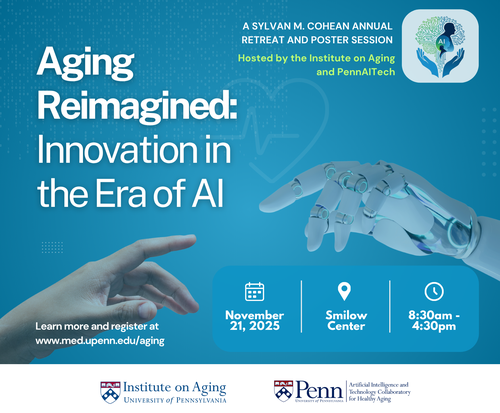Aging Reimagined: Innovation in the Era of AI
By Nicolette Calcavecchia
On Friday, November 21, the Institute on Aging and PennAITech—funded by the National Institute on Aging (Grant No. P30AG073105) hosted the Sylvan M. Cohen Annual Retreat and Poster Session, showcasing how artificial intelligence (AI) is driving new breakthroughs and transforming aging-related research and care.
The keynote address was delivered by Amanda Lazar, PhD, Associate Professor in the College of Information Studies and Director of the Health, Aging, and Technology (THAT) Lab at the University of Maryland. Dr. Lazar kicked off the symposium with her talk, “Redrawing the Boundaries of Innovation: Making AI Work in Real Life.” Her research centers…
View Full Post
Over $34K raised at Penn Medicine's 14th Annual 5K for the IOA and Memory Mile Walk
By Nicolette Calcavecchia
This year marked Penn Medicine's 14th annual 5K for the IOA and Memory Mile Walk! Nearly $35K was raised to support the Joseph A. Brennan Research Scholar Award, contributing to aging-related research and care at Penn's Institute on Aging.


This year's stats:
- 199 Runners and Walkers
- 42 Volunteers
- $34,645 estimated raised
View Race Results here.
View Race Photos here.
View Full Post
From Research to Action: The Real-World Power of the Social Exposome
By Nicolette Calcavecchia
On Tuesday, October 21, 2025 the Institute on Aging hosted its annual Vincent J. Cristofalo Annual Lectureship with keynote speaker, Amy Kind, PhD, Associate Dean for Social Health Sciences and Programs, Professor, Department of Medicine, University of Wisconsin School of Medicine and Public Health.
Dr. Kind’s research focuses on assessing and improving care for highly vulnerable and disadvantaged older adult populations, especially those with Alzheimer’s disease. She strives to develop novel ways to eliminate health disparities through innovative research in health policy and clinical programs.
Her presentation titled "The Power of Social Exposome Research to Catalyze Real-World Change: The…
View Full Post
Meet the Speakers of "Aging Reimagined: Innovation in the Era of AI" - A Sylvan M. Cohen Annual Retreat
By Nicolette Calcavecchia
 "Aging Reimagined: Innovation in the Era of AI"
"Aging Reimagined: Innovation in the Era of AI"
A Sylvan M. Cohen Annual Retreat and Poster Session
Co-sponsored by PennAITech - funded by the National Institute on Aging Grant Nr. P30AG073105
November 21, 2025
8:30am - 4:30pm
Smilow Center for Translational Research, Rubenstein Auditorium and Lobby
and online
Register to attend Submit a Poster Upload your Poster PDF
DEADLINES:
Poster submission closes November 5th.
In-person Registration closes November 11th.
Click here for more registration and poster submission information.

Meet the Speakers
 Amanda Lazar, PhD
Amanda Lazar, PhD
Amanda Lazar is an associate professor in the College of Information…
View Full Post
IOA Member Spotlight: Robert Burke, MD, MS - Reducing hospitalizations and long-term nursing home care for older adults
By Nicolette Calcavecchia

Bob Burke, MD, MS
Associate Professor, Medicine, Perelman School of Medicine
Biography
Robert Burke, MD, MS, is the Associate Chief for Research in the Division of General Internal Medicine and the Division of Hospital Medicine at Penn, and a tenured Associate Professor of Medicine. His research focuses on reducing unnecessary hospitalizations and long-term nursing home care for frail older adults. He leads the VA’s SAGE QUERI implementation science center, which advances evidence-based practices aligned with the Age-Friendly Health System model. His work also addresses health policy and payment reform, supported by R01-level funding from the National Institutes of Health, the…
View Full Post




 "Aging Reimagined: Innovation in the Era of AI"
"Aging Reimagined: Innovation in the Era of AI"
 Amanda Lazar, PhD
Amanda Lazar, PhD